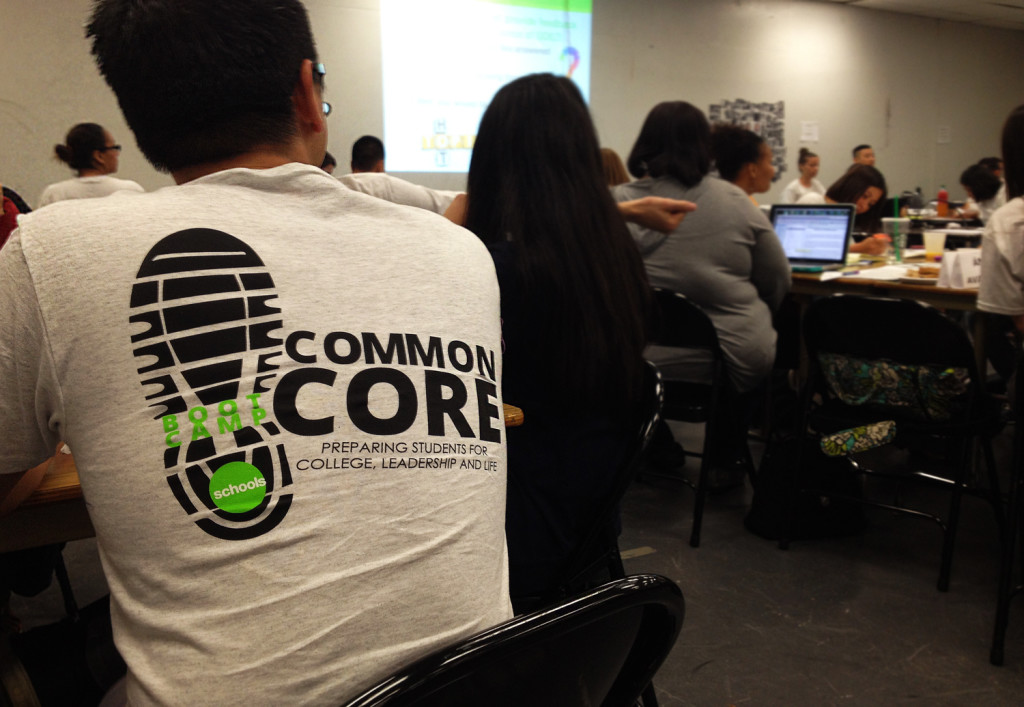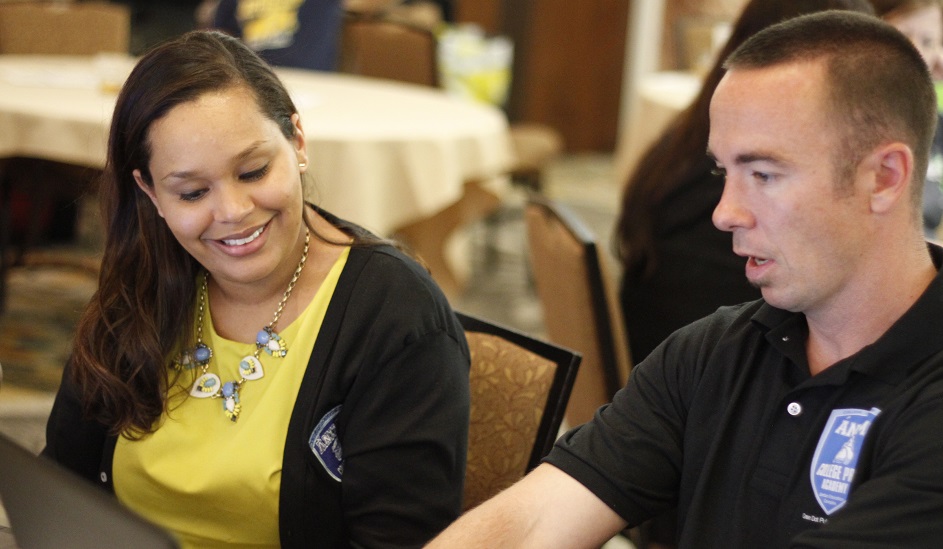Green Dot Public Schools’ Approach to the Common Core


by Annette Gonzalez
Chief Academic Officer, Green Dot Public Schools California
There’s been a lot of talk about Common Core State Standards over the past few years from both supporters and critics. And like so many conversations that take place on social media, message boards, and the comments sections of news outlets, misinformation is rife.
Standards-Based Education
Content Standards are a pre-determined list of progressive skills that students should master in order to graduate high school prepared to succeed in the broadest range of college and career settings. Take, for instance:
- this reading standard for 9th and 10th grade students: ”Determine an author’s point of view or purpose in a text and analyze how an author uses rhetoric to advance that point of view or purpose.”
- this high school geometry standard: “Use volume formulas for cylinders, pyramids, cones, and spheres to solve problems.”
Standards don’t determine how content is taught. They don’t limit a teacher’s creativity. They don’t ignore students’ diverse learning styles. They don’t force students into limited or outdated career paths. They don’t encourage any cultural bias. They simply provide guidance as to what a student should know at a given moment; where they are on a pathway towards graduation and the successful pursuit of their goals.
Adopting New Standards
Beginning in 1997, the California Department of Education, recognizing the need for clarity around expectations, published new academic content standards for students in kindergarten through twelfth grade in subjects ranging from English Language Arts to Physical Education. The standards came to be recognized as some of the most rigorous and well-articulated in the country. In adopting Common Core State Standards, California continues to embrace the principle of high expectations for all.
That isn’t to say that the introduction of new standards is easy. 
Common Core asks teachers to develop students’ cognitive engagement, academic vocabulary, conceptual understanding, and procedural fluency through the use of rigorous, content-rich materials. This calls for dramatic changes in curricula, lesson planning, and teaching strategies, and for teachers to familiarize themselves with new textbooks, instructional materials, and assessment tools.
Recognizing the enormous amount of work that the transition would require of our schools, Green Dot began preparations in 2012 by convening a Common Core Transition Team composed of teachers, school leaders, and district-level curriculum specialists. The team researched best practices across the nation, studying how other states and districts had developed Common Core-aligned curricula and instructional strategies, and developed a comprehensive transition plan for the organization’s 21 schools. The team met quarterly for three years, providing guidance during the development of curricula and assessment tools, piloting them in classrooms, and providing invaluable feedback to inform revisions.
Concurrently, and in close collaboration with teachers and school leaders, Green Dot a three-year phase-in plan focused on successive stages of awareness, transition, and implementation, with each stage increasing the amount of training and professional development provided to teachers. In doing so, Green Dot created online resources to support curriculum development and assessments with teacher leaders.
Each summer, Green Dot hosts a multi-day Boot Camp to give teams time to plan for the coming school year. And throughout the year, educators receive ongoing support from curriculum specialists who provide individualized coaching through classroom observation and feedback. Together, curriculum specialists and educators plan lessons in order to assist with transitioning to the new.
In Support of Common Core
While all of us in public education feel an inherent unease with labeling any school as “failing”, the fact remains that there are many schools in America—thousands of them—that persistently struggle to graduate more than half their students. It’s also indisputable that the majority are located in predominantly low-income, minority neighborhoods; contributing to a generational cycle of lost potential. When inequity in access, quality, opportunity, and outcomes is so tied to communities of color and socio-economic status, it transcends ‘ed reform’ arguments and becomes an issue of civil rights. When critics argue that universal standards present a ‘one size fits all’ approach to education, they’re asking that different students be held to different standards. In doing so, they create a mechanism by which to justify and implement policies of holding socio-economically disadvantaged students and students of color to lower standards than their peers. That’s inequity.
So while we may criticize how states have rolled out the new standards, or question the requirement for online testing; while we can doubt the nature and frequency of assessments, or the problems of tying federal funding to test scores; none of those complaints are a reflection on the concept of national content standards.
That’s why Green Dot welcomes Common Core. Not the  Common Core of conspiracy theory, but the Common Core of reality: guidelines to the progressive accumulation of skills and knowledge required to graduate fully prepared for post-secondary success. Though growing pains are inevitable, we believe that Common Core is good for teachers (improving professional practice and clarifying goals) and good for students (allowing for more effective diagnosis of need and ensuring greater preparation for college and career). We believe that only through a consistent and aligned set of standards can inequities across schools, districts, and states be brought to light and addressed. Our teachers have worked incredibly hard over the past three years to adapt to the requirements of Common Core and we will continue to support our students as Common Core is embedded within the professional practice of all.
Common Core of conspiracy theory, but the Common Core of reality: guidelines to the progressive accumulation of skills and knowledge required to graduate fully prepared for post-secondary success. Though growing pains are inevitable, we believe that Common Core is good for teachers (improving professional practice and clarifying goals) and good for students (allowing for more effective diagnosis of need and ensuring greater preparation for college and career). We believe that only through a consistent and aligned set of standards can inequities across schools, districts, and states be brought to light and addressed. Our teachers have worked incredibly hard over the past three years to adapt to the requirements of Common Core and we will continue to support our students as Common Core is embedded within the professional practice of all.

